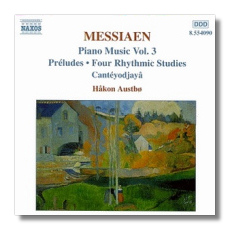
The Internet's Premier Classical Music Source
Related Links
- Messiaen Reviews
- Latest Reviews
- More Reviews
-
By Composer
-
Collections
DVD & Blu-ray
Books
Concert Reviews
Articles/Interviews
Software
Audio
Search Amazon
Recommended Links
Site News
 CD Review
CD Review
Olivier Messiaen

Piano Music - Volume 3
- Préludes
- Four Rhythmic Studies
- Cantéyodjayâ
Håkon Austbø, piano
Naxos 8.554090 DDD 64:51
This is Volume 3 in Austbø's series of Messiaen's piano music. The two earlier releases have been well received, and additional assurance is derived from the fact that Austbø won the Olivier Messiaen Competition for Contemporary Music in 1971.
The Préludes, which were published in 1929, are very early Messiaen; the composer was barely in his twenties. He was a student of Paul Dukas, and this French master's influence can be heard in these eight short works. Debussy also is present, not just in the impressionistic titles ("Un reflet dans le vent," for example) but in the harmony's luminous clouds and in the pianistic swathes and arabesques of color. Much of what was to come is already present, however, particularly in the complex, almost tactile chord-structures that Messiaen builds.
By the time that Messiaen composed Cantéyodjayâ (1948) and the Four Rhythmic Studies (1949-50), he had found new models and cultivated other interests towards developing his new voice. The composer had become fascinated with Hindu musical treatises from many centuries before, and he incorporated these rhythms into his scores. He also had absorbed Schoenberg's influence, and he began to apply his own brand of serialism to his music. As a result, Messiaen's music became more difficult to grasp, although not really more difficult to enjoy, as long one's ears were open to its exotic textures.
The more extreme Messiaen's writing, the more that Austbø seems to like it. He attacks the fearsome hammered rhythms of Cantéyodjayâ and the Four Rhythmic Studies with steely wrists and no inhibitions, and his untangling fingers assist the listener in finding the sometimes hidden paths in Messiaen's complex writing. His objective interpretation of the Préludes minimizes their debt to the past; indeed, some listeners may prefer Michel Beroff on EMI, who is more willing to luxuriate in the music and to be tender. It really comes down to personal preference. Austbø was recorded in a church in Hampshire, England, and producer/engineer Gary Cole has given him a nice sound.
Copyright © 2000, Raymond Tuttle


















